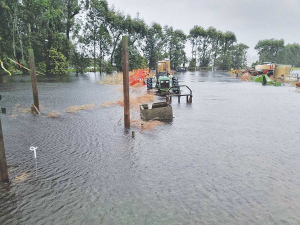Loss of power supply remains the biggest issue facing many Northland farmers.
Federated Farmers Northland President, Colin Hannah, told Dairy News that it may take weeks to fix.
He says trees have taken down the feeder power lines and he knows of one case where six power poles which carry power lines are lying flat by the side of the road. He says the power companies are doing a splendid job, but the problem is massive.
When Hannah spoke to Dairy News last week, there was no power at his drystock farm just out of Whangarei.
Hannah says the impact of the storm has been compounded by the heavy rainfall for the past six months, which have left the ground sodden. He says there are potential animal welfare issues such as cow lameness in the making due to the wet.
“We are probably looking at a disaster in the making which could happen around June, July and August because we haven’t had the opportunity to conserve the feed we had.
“[On] the east coast of the province a lot of the maize crops have failed; some have been planted three times and have gone again.
“A young farmer told me the other day that with the two floods he had in quick succession this year it’s going to cost him about $300,000. It’s incredible,” he says.
Hannah says the nearby Hikurangi swamp which drains into the Kaipara harbour is now a lake and will take some time to drain.
Stock have been moved from the area. He says many farmers are looking for grazing because their farms have been inundated with floodwaters. He’s aware of one farmer looking for grazing for 600 cows. Hannah adds that the kumara crop in Dargaville is devastated.
“Dargaville is a major problem and Ruawai will be without power for some time,” he says.
According to Hannah, cyclone Gabrielle is the worst storm he’s seen in Northland, worse than Bola, and the only other event he thinks may be like it dates back to the 1950s when he was a kid.
He is optimistic about moving on, saying farmers are used to these events and will get through it, but months, potentially years, of work lies ahead before normal life is resumed in the province.
Govt Gives $4 Million
The Government has announced an initial $4 million to help farmers, growers, whenua Maori owners and rural communities mobilise and co-ordinate recovery efforts from cyclone Gabrielle.
Agriculture Minister Damien O’Connor says the breadth of this storm’s impact is unprecedented with milk collection disrupted, orchards inundated and livestock losses across much of the North Island.
“This is a dynamic situation and we are responding accordingly to help the rural sector. I expect we will provide more support once a full and thorough assessment of the damage caused by Gabrielle is complete. That destruction includes flooded farms and orchards, damage to vital roading and electricity infrastructure, and isolated communities. Conditions continue to make it difficult to assess the full extent of crop damage, livestock losses, and disruption,” he says.











